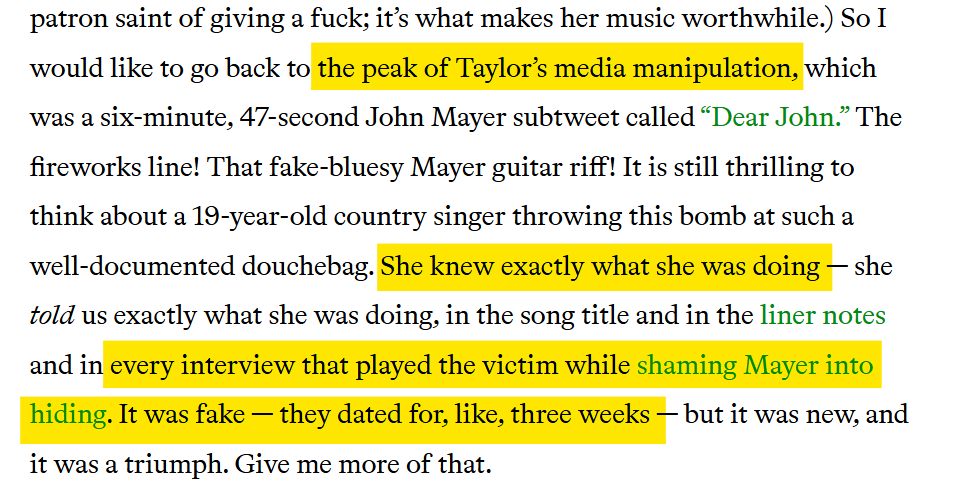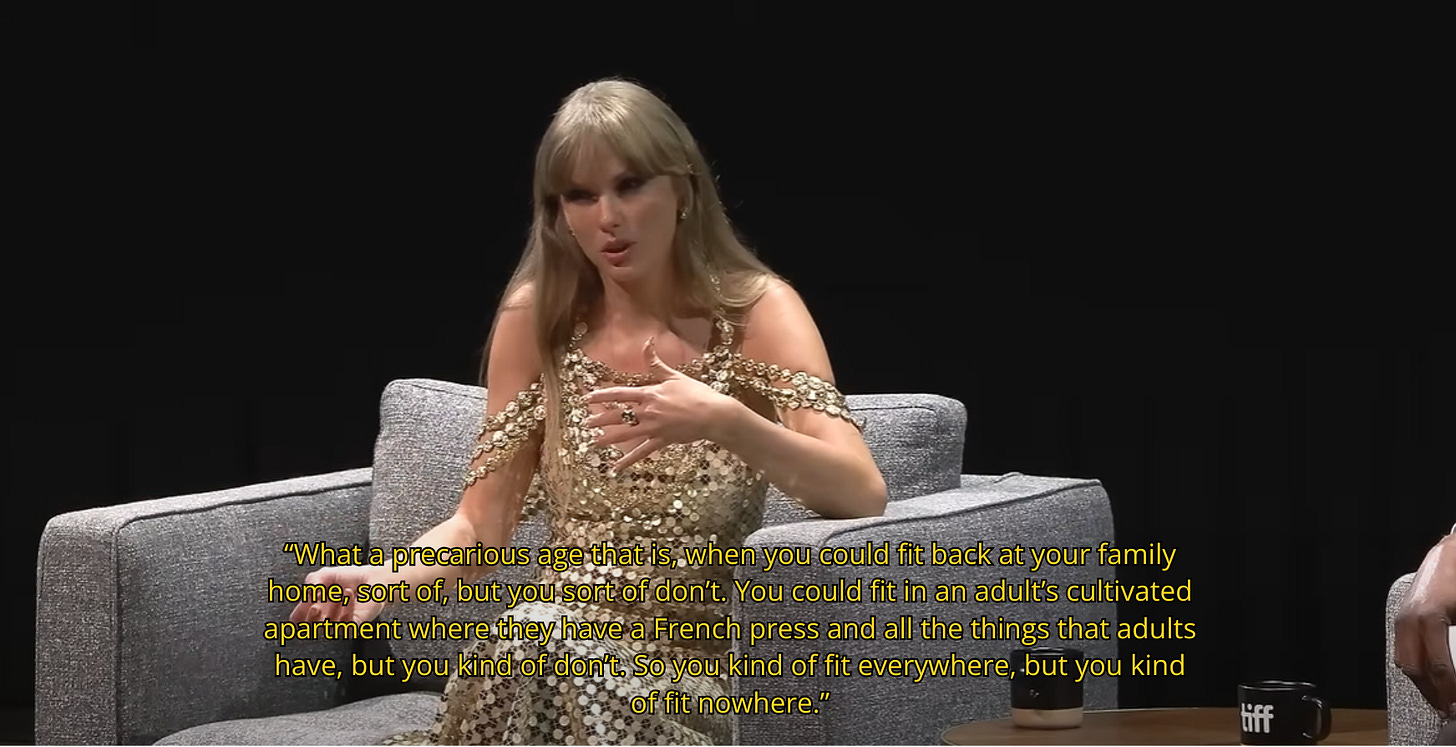
Welcome or welcome back to Analysis of a Song, the series where I pick a song and break down the lyrics section by section. Last time, I looked at the 2010 Speak Now song, Dear John. So this time, I thought it only right to look at Dear John’s sister song. The song in question, of course, is Would’ve, Could’ve, Should’ve, from 2022’s Midnights. This song really feels like a sequal to Dear John; they’re about the same situation, except Dear John is Taylor reflecting on the situation right after it happened, and Would’ve, Could’ve, Should’ve is Taylor reflecting on it 12 years later. She’s older, she’s wiser, she’s experienced a bit more life, and she’s finally processed how messed up it all was. This is, without a doubt, one of the most heartbreaking songs on Taylor’s entire discography. It never fails to give me chills.
Verse 1
If you would’ve blinked, then I would’ve looked away at the first glance
If you tasted poison, you could’ve spit me out at the first chance
If I was some paint, did it splatter on a promising grown man?
And if I was a child, did it matter if you got to wash your hands?
Often when we look back on past events, we obsess over the what-ifs. We think to ourselves, ‘if this one tiny miniscule thing was different, then none of that would’ve happened.’ As she says in the 1: “If one thing had been different, would everything be different today?” If this person had so much as blinked at Taylor the wrong way, to let her know they were bad news, she would’ve ran for the hills. She would’ve look away, and those lingering stares would never escalate into anything more. But it’s not all on Taylor. If he had sensed something sour, if he had sensed Taylor would release a song about him that would paint him in a terrible light, he too could’ve ran for the hills. But he didn’t, and nor did Taylor. What happened, happened. She needs to accept the reality, but that’s exactly what she’s been struggling to do for the last 12 years.
In the next lines, Taylor references their age difference. As I said in the Dear John analysis, both songs are about a relationship Taylor was in with a man 12 years her senior; more specifically, she was 19, and he was 32. Taylor referring to him as a “promising grown man” is a play on the phrase “promising young man.” Often in society, young men tend to get shielded under the blanket of a hypothetical promising future, despite any wrongdoings they may have committed. This is especially seen when victim-blaming a woman. When Taylor released Dear John, the media did not take her side. Instead of scolding John for dating a teenager in his 30s, they accused Taylor of humiliating John (it was 2010, of course they were going to take the man’s side). It’s almost as if she’s mocking these people who acted like John was this bright young man whose reputation she tried to smear. He wasn’t a bright young man, he was 32. He was grown.

To contrast, in the next line, she refers to herself as a child. Calling him a grown man and then in the very next line calling herself a child really emphasises the age differences. As I said, she was 19 at the time. While 19 is legally an adult, many still consider people in that 18-22 age bracket to be kids. But that didn’t matter to him. At the end of the day, he didn’t care how young or old she was. All he cared about was having another person to play his mind games on and get a power trip out of messing with. This line is possibly a play on the idiom of “washing your hands of” something. To wash your hands of a situation means to essentially clean yourself of it; decide that you no longer want anything to do with it, no matter how big a role you may have played in it.
That’s what this person is trying to do. He’s trying to wash his hands of the whole ordeal, sweep it under the rug, pretend it never happened, and act like he doesn’t have to take accountability because of that. Her age isn’t relevant anymore because he’s washed his hands of the situation. Taylor, of course, is not going to let him do that quite so easily. The last song she wrote about him got her accused of humiliating him and trying to make him feel ashamed? Well, she’s going to write another song about him over a decade later to remind the world and him just how messed up what he did to her was.
Pre-Chorus
Oh, all I used to do was pray
Would’ve, could’ve, should’ve
If you’d never looked my way
One thing many people have picked up on about this song is that it is filled to the brim with religious references. Religion has always played an interesting role in Taylor’s career. She certainly framed herself as a Christian when she first debuted as a country artist; she referenced God in a song or two and would occasionally thank God in an acceptance speech. But in the early 2000s, being an American country artist was synonymous with Christianity, so it’s hard to know if she was just pandering to her audience. As she ventured into pop music, the acceptance speech shout-outs definitely faded away, but she did refer to herself as a Christian in her 2020 documentary, Miss Americana. However, in her later albums, especially The Tortured Poets Department, Taylor makes religious references constantly, but not always in a positive way; this song being one of the less than positive examples.
The first religious reference comes when Taylor says how often she used to pray. Again, we go back to the what-ifs. ‘If I had known this, then I would’ve… if this had happened instead, then I could’ve… I ought to have done this, I should’ve…’ It’s almost as if she’s bargaining with herself. She wishes he’d never even looked in her direction.
Chorus
I would’ve stayed on my knees
And I damn sure never would’ve danced with the devil
At nineteen
And the God’s honest truth is that the pain was Heaven
And now that I’m grown, I’m scared of ghosts
Memories feel like weapons
And now that I know
I wish you’d left me wondering
We have a a call back to the pre-chorus within the first line. She’s further building that religious imagery. Often when people pray, they kneel. It’s also common to be asked to kneel during a church service. Maybe Taylor didn’t pray enough. Maybe if she had stayed on her knees and kept praying, God never would’ve sent this person into her life. It’s the first we see of the religious guilt and questioning that is woven throughout the entire song. Dancing with the devil is a popular saying, often used to describe partaking in a potentially reckless activity. It’s safe to assume the ‘devil’ in question is the subject of the song. It’s not even the only time she references the devil on this album; on another Midnights 3AM track, Dear Reader, she says: “Dear reader, when you aim at the devil, make sure you don’t miss.”
Just as she did in Dear John with the line, “don’t you think 19’s too young to be played by your dark twisted games,” she’s specifically mentioning her age here. She was only 19. She was only a year into adulthood. I’m reminded of another sister song of Dear John and Would’ve, Could’ve, Should’ve — The Manuscript. She heavily references age gap relationships on that track as well, stating, “in the age of him she wished she was 30, and made coffee every morning in a French press (…) she thought about how he said since she was so wise beyond her years, everything had been above board. She wasn’t sure.” He tried to convince her it was okay because of how mature she was for her age. But she sees that now for the excuse it was. It doesn’t change the facts: she was only 19.

In the next line, she references God yet again to tell us that even though the aftermath was catastrophic, while she was in it, it was Heaven. In the beginning, he likely showered her with love and affection and attention. But very quickly, that disappeared. As she says in Dear John, “maybe it’s you and your sick need to give love then take it away.”
In the second half of the chorus, she acknowledges that time has passed. She’s grown up now. She’s older. She’s wiser. But that doesn’t stop the past from haunting her. She says she’s scared of ghosts, which reminds me of a line from the Speak Now deluxe track Ours: “Ghosts from your past gonna jump out at me.” Now it’s ghosts from her own past jumping out at her. Never letting her rest; never letting her forget. “Memories feel like weapons.” The memories she has from this time in her life, they’re like weapons her own brain uses against her in moments of vulnerability. She still ruminates on the entire situation, even 12 years later.
It’s no secret the muse of this song is a well-known musician himself. Taylor has stated multiple times how big of a fan she was. That directly plays into the power imbalance between them; he was the idol, and she was the fan. It wasn’t just the age gap that shifted the power. She used to daydream about being with him, constantly wondering what it would be like, but thinking it would probably never happen. How could a rockstar like him ever like someone like her? Someone who had barely gotten started in the industry? But she did find out. And now she wishes she didn’t. She wishes she had forever been left wondering; she wishes he was forever an unanswered question, forever a what-if.
Verse 2
If you never touched me, I would’ve gone along with the righteous
If I never blushed, then they could’ve never whispered about this
And if you never saved me from boredom, I could’ve gone on as I was
But Lord, you made me feel important, and then you tried to erase us
This second verse largely ties into the purity culture of Christianity. In most religions, the expectation is that you save yourself for marriage. Even thinking the wrong sort of way can lead to judgement. “Righteous” is such a strong and specific word, one that is used by many in the church. For individuals in the church, upholding the strict moral code is of most importance. The way she’s describing it, it’s as if this person tainted her. He led her into sin. It reminds me of those 19th century shows like Bridgerton where they talk about young women being “ruined” and “led astray.”
The “they” she lists as whispering about her is likely a reference to the media and general public, but it also reminds me of the way people in church react when scandle breaks out; they can’t outright talk about it, because doing so wouldn’t be righteous, so instead they whisper in secret and gossip over coffee meet-ups, while showing passive aggressive, hardly concealed judgement to your face. It reminds me of a lyric from But Daddy I Love Him, another Taylor song rife with religious imagery: “Sarahs and Hannahs in their Sunday best, clutching their pearls, sighing ‘what a mess,’ I just learned these people try and save you ‘cause they hate you.”
Taylor then talks of being “saved from boredom.” Even at 19, she was already bored. Bored with the boys her own age; the ones who make you think romance and chivalry must surely be dead. But then this older guy swooped in. He swooped in and showered her with affection and made her feel special. But then all that disappeared with no notice. All of a sudden, he retreated and acted like he’d never shown interest in Taylor at all; like nothing had ever happened between them. This hot and cold kind of behaviour is all over Dear John: “You paint me a blue sky, then go back and turn it to rain (…) maybe it’s you and your sick need to give love then take it away.” He made her feel like she was his entire world, and then erased it all over night, leaving Taylor to wonder why he didn’t just leave her alone to begin with. In hindsight, she would rather he’d left her to be consumed by boredom.
It’s worth noting that even in the verses, there’s a repetition of the words would’ve and could’ve. They appear on another song on the album as well, on the 3AM track, Bigger Than the Whole Sky: “I’m never gonna meet what could’ve been, would’ve been, what should’ve been you.” I’m not saying there’s necessarily a connection between those two songs, but it’s an interesting parallel.
Pre-Chorus 2
Oh, you’re a crisis of my faith
Would’ve, could’ve, should’ve
If I’d only played it safe
This small lyric change in the second pre-chorus is, in some ways, the thesis statement of the entire song. “You’re a crisis of my faith.” What a heavy and loaded thing to say to a person. To say that one person rocked your world so deeply that they have caused you to question your religion; your belief in God; your fundamental understanding of how the world works. That is how much this person unmoored her. She wishes she had played it safe, but she didn’t. She took the risk, she danced with the devil, and now she’s facing the fallout.
Chorus 2 (Added Section)
God rest my soul, I miss who I used to be
The tomb won’t close, stained glass windows in my mind
I regret you all the time
I can’t let this go, I fight with you in my sleep
The wound won’t close, I keep on waiting for a sign
I regret you all the time
Again, Taylor is using a popular religious phrase, except this time with a slight twist. Sometimes when a person has died, people will say, “God rest their soul,” as a way of hoping they’re in a better place now. But Taylor says, “God rest my soul.” She wishes her soul could finally experience some rest from reliving this experience. To me, one of the most powerful and heart-wrenching lines of the song is, “I miss who I used to be.” Even now, as a fully grown adult, she still mourns the innocent and optimistic version of herself that existed before he came into her life and ripped that, and her youth, away.
Because that’s what happens, isn’t it? We go through a traumatic experience and we come out the other end of it changed. And no matter how much we try, we can’t go back. We can’t ever get that happier, untouched, undisturbed version of ourselves back. That’s not how life works. But that doesn’t stop Taylor from longing. In the next line, Taylor references a tomb. This is yet another religious reference. The tomb is a crucial symbol in the story of Jesus’ resurrection. After he dies on the cross, his body gets sealed in a tomb. However, when they open up the tomb three days later, Jesus is gone. Just another one of the subtle ways Taylor has incorporated religion into the lyrics; in ways you might not notice at first.
At first, the lyric “stained-glass windows in my mind,” may seem like just another way of weaving in religious imagery, as churches are the most common places you’ll see such windows. However, I do think it’s worth mentioning that the person this song is supposedly about used to live in an old church turned house. While renovated, some of the original designs remain, including stained-glass windows in the kitchen. No wonder religion is so closely connected to this person in her mind.


Regret is a strong theme across both Dear John and Would’ve, Could’ve, Should’ve, and that’s stated quite plainly in the line, “I regret you all the time.” It’s clear this is something she still thinks about a lot. She wouldn’t be writing about it 12 years later if she didn’t still feel a strong sense of regret. She doesn’t know why, but she can’t seem to let go. She wishes she could move on, she wishes she could say she’s past it. But she just can’t seem to. Taylor saying this person fights with her in her sleep suggests he still visits her in dreams. When he appears, she tries to argue with him. She demands answers. She never finds them. Even in her sleep, she can’t escape. Even in her sleep, he still haunts her.
This situation is like an open wound that won’t heal over. No matter how much time passes, she can’t seem to heal. She can’t get closure. She says she’s waiting for a sign. A lot of the time when we go through shitty things, we hate it while we’re in it, but once we’re through it, we can usually acknowledge it happened for a reason. We grew as a person because of it; we came out stronger and wiser. Taylor doesn’t feel that way. She can’t find a reason. She doesn’t feel stronger. She’s looking to God for any kind of sign she didn’t suffer for no reason, that there was some kind of divine purpose behind it. But it’s been 12 years now, and she still hasn’t received a sign. Hence her crisis of faith.
Bridge
If clarity’s in death, then why won’t this die?
Years of tearing down our banners, you and I
Living for the thrill of hitting you where it hurts
Give me back my girlhood, it was mine first
Again, Taylor is wondering when the clarity will hit her. When she’ll finally unlock the puzzle and understand what it was all for. Their relationship and spark died long ago, so why is it still lingering so much? Why can’t her mind put it to bed? As she says in Death By a Thousand Cuts: “If the story’s over, why am I still writing pages?” She’s spent years doing everything in her power to remove him from her mind, to rip out those pages from that chapter of her life, to little success.
To me, when she says, “living for the thrill of hitting you where it hurts,” she’s talking about songwriting. As I’ve already said, the person this song is about is not only a musician himself, but a songwriter. In fact, he’s known for being one of the most celebrated male songwriters in recent times. It is also well documented that he did not respond warmly to Dear John when it came out. Taylor has stated in interviews she received a very angry email after its release, and John has said in interviews afterwards it was a cheap, lousy, and humiliating thing for her to do (which is bullshit, btw).
Writing songs about him is the only means Taylor has of getting back at this person. It’s the only way she can get some form of revenge. She wants to make him feel even just a shred of the same amount of pain she felt, or maybe even some remorse for his actions. She’s doing that by using his own thing, his own talent, against him — writing songs. Usually he’s the one writing songs about other people, so to have someone write a song about him and paint him in a bad light? Taylor knows this very song is hitting him where it hurts. And you know what? I bet it drives John mad that of the two of them, he’s no longer the most revered songwriter.
Finally, we get the line of all lines. The biggest gut punch of the song, and the album, and maybe even Taylor’s entire discography. “Give me back my girlhood, it was mine first.” We surely know at this point from the hundreds upon hundreds of Substack essays on it that girlhood — it’s sacred. Girlhood is such a formative time in a woman’s life. Girlhood contains the bliss and joys and naivety and innocence of youth; of childhood. She was only 19, so while legally an adult, she was still a teenager. As already said, she wasn’t the same young naive girl after this. He stole her youth from her. He stole her naivety. He stole her innocence. The way the line is phrased, “give it back, it was mine first,” it almost sounds like a child throwing a tantrum. Her inner child is lashing out, stomping her foot, demanding he give back what’s rightfully hers. There’s something childish about the way she phrases it, which makes it all the more hard-hitting.
As Taylor repeats the second chorus twice in a row, by the end, she’s practically screaming the words. The line she ends the song on is: “I regret you all the time.” There’s no ending to this song, let alone a happy one. It doesn’t get wrapped up in a nice little bow. She’ll continue to be haunted. She’ll continue to ponder the what-ifs. She’ll continue to regret.
If I can speak my truth, this is undoubtedly one of the most well-written songs on Taylor’s entire discography. Sometimes I don’t listen to it for a while, but when I finally do revisit it, it’s like I’m listening to it for the first time all over again. A gut punch every time. This song is tied with You’re Losing Me as my favourite song from Midnights. Both of those, might I add, aren’t on the standard edition of the album (she always does this. She always puts the best songs among the bonus tracks and thinks we won’t notice, but we do. I still think it’s a travesty right where you left me was shoved to the bonus edition of evermore…).
Hope you’ve enjoyed this, as rambly as it was. If you did enjoy it, feel free to check out my Dear John lyrical analysis. If you have any different interpretations to certain lyrics in this song, I’d love to hear them in the comments.
Until next analysis,
- Lilly :)






ah! love this series!!!